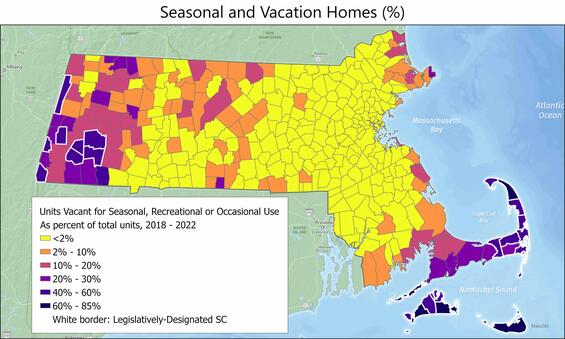Section 32 (b) of the Affordable Homes Act states that the following municipalities are automatically designated as Seasonal Communities: "all municipalities in the counties of Dukes and Nantucket and all municipalities with over 35 per cent seasonal housing units in the county of Barnstable, as determined by the executive office in consultation with the Cape Cod commission established in chapter 716 of the acts of 1989 and all municipalities with more than 40 per cent seasonal housing units in the county of Berkshire, as determined by the executive office in consultation with the Berkshire regional planning commission." The legislation also empowers EOHLC to designate additional seasonal communities based on other factors, in consultation with the Seasonal Communities Advisory Council.
The most commonly accepted and comprehensively available definition of seasonal housing comes from the American Community Survey. The ACS classifies units into occupied and vacant. Table B25004 breaks down the count of vacant units by “Vacancy Status.” One status is “For seasonal, recreational, or occasional use.” Those terms are defined by the Census Bureau as follows:
For occasional use: If the vacant unit is not for-rent or for-sale-only but is held for weekends or occasional use throughout the year, the unit is included in this category. Time-shared units are classified in this category if the vacant unit is not for-rent or for-sale-only, but held for use for an individual during the time of interview.
Seasonal Vacant Units: Seasonal housing units are those intended for occupancy only during certain seasons of the year and are found primarily in resort areas. Housing units held for occupancy by migratory labor employed in farm work during the crop season are tabulated as seasonal. As of the first quarter 1986 vacant seasonal mobile homes are being counted as a part of the seasonal housing inventory.
The Cape Cod Commission’s Regional Housing Needs Assessment and the Berkshire Regional Planning Commission’s Berkshire Benchmarks both use the estimate of seasonal, recreational, or occasional use vacant units as the basis for their seasonal home estimates. EOHLC consulted with CCC and BRPC staff regarding this matter and both concurred with the approach described below:
Using data from the 2018 - 2022 American Community Survey, EOHLC estimated what municipalities would qualify as Seasonal Communities based on this metric. The denominator for the estimate is the total housing units in the municipality from the same ACS data. The map below shows the estimated share of homes that are vacant for seasonal, recreational, or occasional use, by municipality. This analysis identified nine municipalities on the Cape and eight in Berkshire County that would receive an automatic designation based on the legislation. Those municipalities are highlighted with a white border on the map.

The table below lists the 25 municipalities that EOHLC has determined are legislatively-designated Seasonal Communities.
Legislatively Designated Seasonal Communities
There were three Barnstable municipalities that missed the 35% seasonal cutoff by less than five percentage points: Yarmouth (32.7%), Mashpee (31.2%), and Falmouth (30.6%). There were two municipalities within five percentage points of the 40% seasonal cutoff for Berkshire County: West Stockbridge (38.1%) and Sandisfield (35.9%). There are only two municipalities outside of Barnstable, Berkshire, Dukes, and Nantucket Counties where seasonal units comprise more than 35% of total housing: Heath (Franklin County, 40.0%); and Tolland (Hampden County, 58%).
If you have additional questions, contact Tim Reardon, EOHLC Chief of Data and Research, at timothy.reardon2@mass.gov.
| Date published: | April 18, 2025 |
|---|---|
| Last updated: | April 18, 2025 |